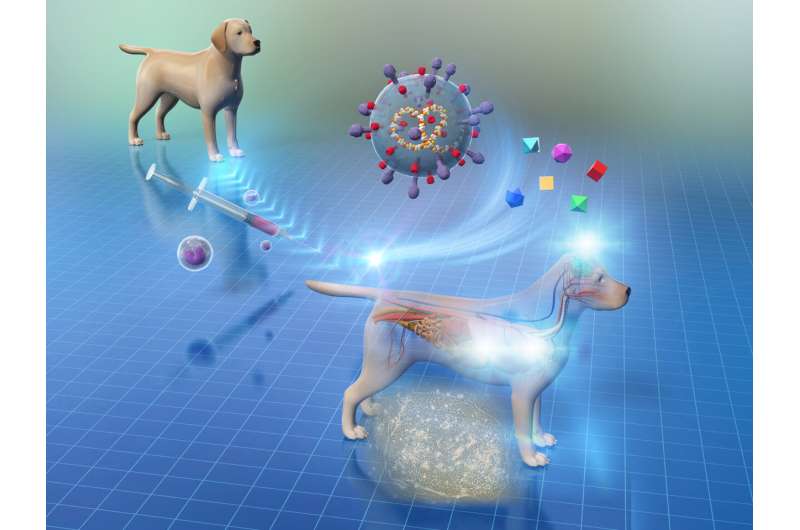Researchers induce pluripotency in differentiated canine cells for the first time

Dogs have been faithful human companions ever since their domestication thousands of years ago. With improvements in veterinary medicine in recent decades, their life expectancy has increased. However, an unfortunate side effect of this longevity, much like in humans, has been an increase in the occurrence of chronic and degenerative conditions.
In humans, modern efforts to fight such diseases have culminated in the development of regenerative therapies, largely based on stem cells. These have the potential to differentiate and mature into many specialized cell types—a trait called "pluripotency." By transplanting stem cells and guiding their differentiation into desired cell types, researchers are effectively able to regenerate damaged tissues, thereby reversing the course of complex diseases. Although this technology is widely studied in humans, studies into stem cell therapy for dogs is lacking.
To this end, a research team from Japan, led by Associate Professor Shingo Hatoya from Osaka Prefecture University, has been working on isolating "induced pluripotent stem cells" (iPSCs) from canine blood samples. iPSCs are a type of stem cell that can be programmed from a developed (or differentiated) cell by introducing a specific set of genes into them. These genes code for proteins called transcription factors, which induce the change from a differentiated to a pluripotent stem cell, which then has the ability to mature into multiple cell types. iPSCs can proliferate very rapidly, providing a reliable supply of suitable stem cells for regenerative therapies.
"We successfully established an efficient and easy generation method of canine iPSCs from peripheral blood mononuclear cells," says Dr. Hatoya. He says that in the near future, "it may be possible to perform regenerative medicinal treatments in dogs." These findings were published in the journal Stem Cells and Development.
Their previous attempts to generate iPSCs from canine blood cells using viral vectors to deliver the pluripotency-inducing transcription factors were not as effective as hoped. Therefore, in this study, they tested a different combination of inducing factors. Most importantly, the researchers needed to control how the reprogrammed cells replicated in the host body. Viral vectors that encode pluripotency-inducing transcription factors can be used to infect cells obtained from the blood and convert them into iPSCs; however, the researchers needed to be cautious: These vectors integrate into the host genome, and re-expression of these pluripotency factors in the host cell can cause tumor formation. To avoid this, the team developed "footprint-free" stem cells by using a particular type of viral vector that can generate iPSCs without genomic insertion and can be automatically silenced via microRNAs expressed by the cells. Then, they grew the cells in a medium that contained factors that enhance their pluripotency. The cells grew and successfully developed germ layers, which form the basis of all organs.
The findings have paved the way for an easy stem cell therapy technique for dogs. "We believe that our method can facilitate research involving disease modeling and regenerative therapies in the veterinary field," says Dr. Hatoya. Furthermore, the authors also believe that additional research into regenerative therapies for canines might have ripple effects for human medicine. "Dogs share the same environment as humans and spontaneously develop the same diseases, particularly genetic diseases."
More information: Kazuto Kimura et al, Efficient Reprogramming of Canine Peripheral Blood Mononuclear Cells into Induced Pluripotent Stem Cells, Stem Cells and Development (2020). DOI: 10.1089/scd.2020.0084
Provided by Osaka Prefecture University





















